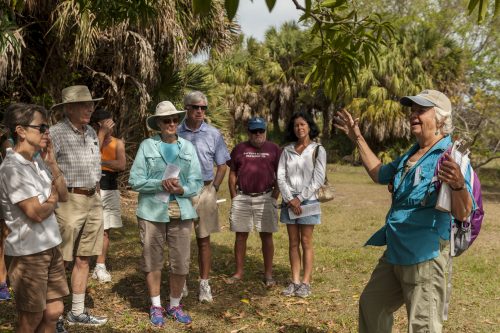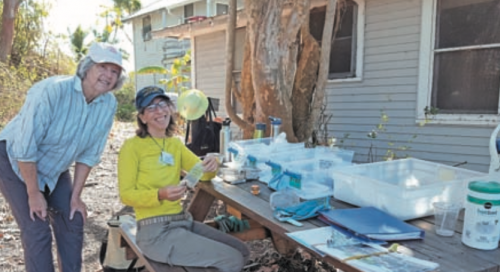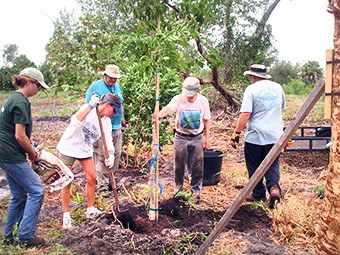Community accessibility, participation, and support is fundamental to the Randell Research Center at Pineland and on the Calusa Heritage Trail! We offer many opportunities to volunteer, have fun with RRC staff, and serve the RRC mission as part of the Florida Museum of Natural History.
We appreciate and rely heavily upon our dedicated volunteers. Volunteers are an essential component of the operation of the center, including everything from public outreach and site tours, childhood and family education planning, site landscape maintenance and conservation, and behind the scenes organizational tasks! The following materials have been developed in order to provide an initial orientation for prospective volunteers.
Volunteers may plan to come in on a regular schedule to help out on the trail, in the classroom, or office, or they may simply remain on the “on-call” list for specific tasks, such as research field work or special events, or large-scale work days such as vegetation clearing or bulk mailing. In any case, volunteers are asked normally to work at least one shift each month they reside in Southwest Florida in order to remain on the active roster.
Training and Enrichment

A significant part of being a volunteer is having access to exclusive training and enrichment programs! While attendance is always encouraged, it is not mandatory. These opportunities are offered by RRC staff, other Florida Museum of Natural History staff, and visiting researchers and scholars. Written training materials will be provided to all volunteers interested in specific jobs or tasks. Volunteers are encouraged to read and study on their own, and for this purpose books are available for use at the RRC offices and copies of scholarly papers are provided by RRC staff.
We also strive to coordinate an annual fieldtrip opportunity for volunteers. While these opportunities are usually self-funded, RRC staff facilitates the scheduling and programing for fieldtrip activities.
Volunteer suggestions for possible volunteer tasks, topics for enrichment, and fieldtrips are always welcome!

of field-processing finds as they come from the excavations. (Photo by Karen Walker.)
Timesheets
Volunteers should sign in and record the total hours they worked on a volunteer timesheet for each shift or event. The timesheet will normally be placed at the reception desk in a notebook, or in another prominent location. This information is important for purposes of evaluation and for writing grant proposals, and each volunteer should be responsible for recording her/his hours in a timely fashion.
Calendar of Events

A calendar is maintained at the RRC headquarters with upcoming special events, tours, meetings, training sessions, etc., and volunteers should consult this calendar in order to plan their volunteer activities and time. Volunteers should be pro-active in contacting the RRC when they are unable to come in for scheduled work or complete planned tasks.
Job Descriptions
Volunteer activities at the Randell Research Center generally fall into the following categories based on the needs of the RRC, as outlined below. These job descriptions are not mutually exclusive, and each volunteer may participate in one or more activities, depending on their interest, time, and physical capabilities. All jobs are important elements of the success of the Randell Center, and flexibility and participation in multiple activities characterizes the ideal RRC volunteer.